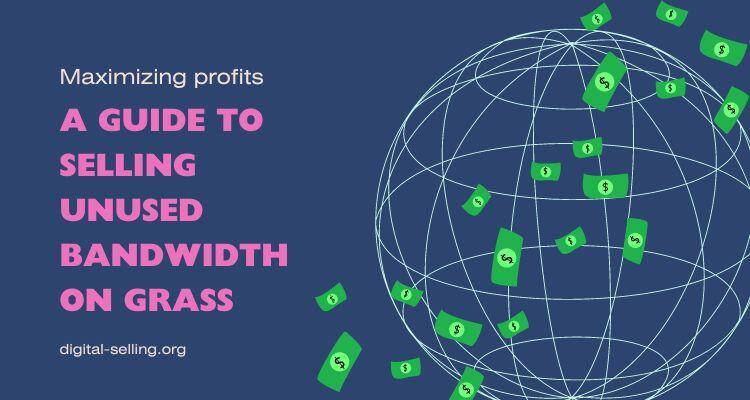In today’s digital era, selling unused bandwidth offers a unique way to generate passive income. Learn how to do this effectively on Grass.
In the age of connectivity, bandwidth has become a valuable commodity. Many individuals and businesses find themselves with surplus bandwidth, which often goes unused. This unused resource presents a lucrative opportunity for generating passive income. Grass, a pioneering platform in this domain, offers an accessible as well as efficient way to monetize this surplus. So, in this comprehensive guide, we delve into the benefits and processes involved in selling unused bandwidth on Grass.
Understanding Unused Bandwidth
Before exploring the mechanics of selling unused bandwidth, it’s essential to grasp what unused bandwidth entails. Bandwidth refers to the maximum rate of data transfer across a network. Many users purchase more bandwidth than they actually need to ensure smooth and uninterrupted internet access. However, a significant portion of this bandwidth often remains untapped.
Unused bandwidth is the portion of the allocated bandwidth that goes unutilized. For instance, if an internet plan provides 100 Mbps, but the average usage is only 60 Mbps, the remaining 40 Mbps is considered unused. This excess bandwidth can be sold to those in need of additional resources, creating a win-win situation for both parties.
Why Sell Unused Bandwidth?
Selling unused bandwidth offers multiple advantages:
- Passive Income: Generate extra revenue without additional effort. Hence, your existing internet connection becomes a source of income.
- Resource Optimization: Maximize the utility of your internet plan by leveraging every bit of your purchased bandwidth.
- Supporting Network Efficiency: By redistributing unused bandwidth, you contribute to a more efficient network ecosystem.
The Grass Platform: An Overview
Grass stands out as a leading platform for selling unused bandwidth. It connects sellers with buyers, facilitating a seamless as well as secure transaction process. Here’s why Grass is an ideal choice:
- User-Friendly Interface: Grass offers a straightforward and intuitive interface. Hence, making it easy for users to list and manage their bandwidth.
- Security: The platform prioritizes security, ensuring that transactions are safe as well as keeping user data secure.
- Transparency: Grass provides clear and transparent pricing, helping users understand the market value of their unused bandwidth.
Getting Started with Grass
Selling unused bandwidth on Grass is a simple and streamlined process. Follow these steps to get started:
1. Sign Up and Create an Account
Begin by signing up on the Grass platform. Provide the necessary details to create your account. Ensure that your profile is complete, as this builds trust with potential buyers.
2. List Your Unused Bandwidth
Once your account is set up, navigate to the ‘Sell Bandwidth’ section. Here, you can list the details of your unused bandwidth. Be specific about the amount of bandwidth available, your internet provider, and the duration for which it is available.
3. Set Your Price
Grass allows you to set your price or opt for dynamic pricing based on market demand. It’s advisable to research current rates to competitively price your bandwidth. The platform offers tools and insights to help you determine the best pricing strategy.
4. Monitor and Manage Listings
After listing your unused bandwidth, monitor your dashboard for any inquiries or offers. Grass provides real-time updates and notifications, ensuring you don’t miss any potential sales.
5. Complete Transactions
When a buyer is interested, Grass facilitates the transaction process. The platform handles payment processing and ensures that funds are securely transferred to your account.
Tips for Maximizing Earnings
To make the most out of selling unused bandwidth on Grass, consider these tips:
1. Regular Monitoring:
Stay active on the platform and regularly monitor your listings. Quick responses to buyer inquiries can lead to faster transactions.
2. Competitive Pricing:
Keep an eye on market trends and adjust your pricing accordingly. Competitive pricing attracts more buyers and increases the likelihood of sales.
3. Optimize Bandwidth Allocation:
Ensure that you allocate bandwidth that is genuinely unused. Overestimating available bandwidth can lead to disruptions in your internet service.
4. Leverage Analytics:
Utilize the analytics tools provided by Grass to track the performance of your listings. Insights into buyer behavior as well as market trends can help you optimize your sales strategy.
Legal and Ethical Considerations
While selling unused bandwidth is a lucrative opportunity, it’s crucial to be aware of legal and ethical considerations:
- Check ISP Policies: Review your internet service provider’s terms and conditions. Some ISPs may have restrictions on reselling bandwidth. Ensure that you comply with these policies to avoid any legal issues.
- Data Privacy: Maintain transparency with buyers regarding the data usage policies. Ensure that your bandwidth usage is ethically and does not compromise any data privacy regulations.
- Fair Usage: Ensure that the sale of your bandwidth does not adversely affect your primary internet usage. Balance the allocation to maintain a seamless online experience for yourself.
Final words about selling unused bandwidth on Glass
Selling unused bandwidth on the Grass platform offers a smart and efficient way to generate passive income. So, by optimizing the use of your existing internet connection, you can turn a seemingly redundant resource into a profitable venture. In addition, Grass simplifies the process, providing a secure and user-friendly platform for sellers and buyers alike. Embrace this opportunity to monetize your surplus bandwidth and contribute to a more efficient digital ecosystem.
In summary, selling unused bandwidth on Grass is not just about earning extra money; it’s about maximizing resources and fostering a more connected world. With the right approach and adherence to best practices, you can make the most of this innovative platform and enjoy the benefits of passive income.

